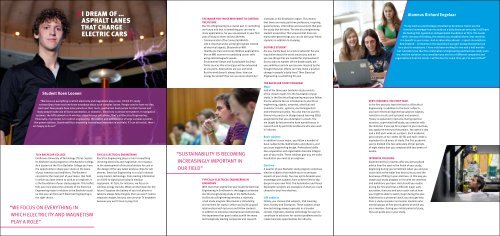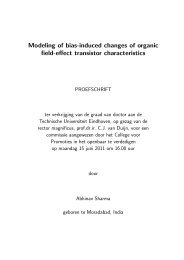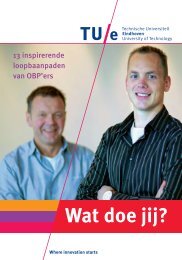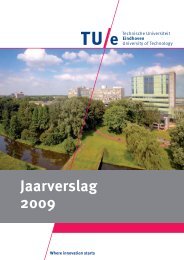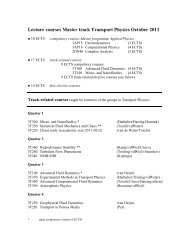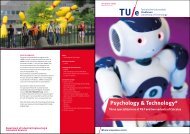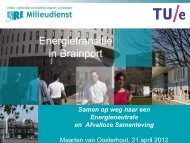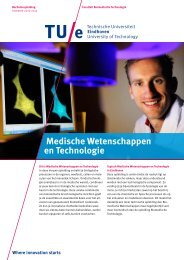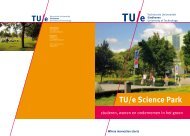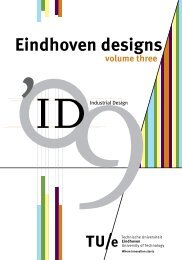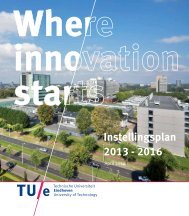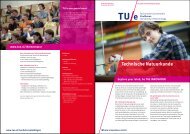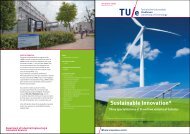Bachelor brochure Electrical Engineering
Bachelor brochure Electrical Engineering
Bachelor brochure Electrical Engineering
Create successful ePaper yourself
Turn your PDF publications into a flip-book with our unique Google optimized e-Paper software.
I dream of …<br />
asphalt lanes<br />
that charge<br />
electric cars<br />
The major for those who want to control<br />
the future<br />
<strong>Electrical</strong> <strong>Engineering</strong> is a crucial part in controlling<br />
our future and that is something you can see in<br />
many applications. So you are exposed in your first<br />
year of study to three societal themes:<br />
- Communication (The Connected World):<br />
Like a chip that works using light signals instead<br />
of electrical signals, Bluetooth or WiFi.<br />
- Healthcare (Care and Cure): Medical applications<br />
like an MRI scanner or combating cancer cells<br />
using electromagnetic waves.<br />
- Environment (Smart and Sustainable Society):<br />
Finite sources like oil and gas will be exhausted<br />
at one point. Alternatives are sun and wind.<br />
But the wind doesn’t always blow. How can<br />
energy be stored? How can you store electricity?<br />
institutes in the Eindhoven region. This means<br />
that there are many part-time professors, inspiring<br />
guest lectures, internships and excursions that give<br />
the study that bit extra. The electrical engineering<br />
student association Thor ensures that there are<br />
many other great things you can do with your fellow<br />
students in addition to studying.<br />
Suitable student<br />
Are you mainly keen on science subjects? Are you<br />
inquisitive about the world around you and do<br />
you see things that are needed for improvement?<br />
Do you want to wander off the beaten path, are<br />
you ambitious and do you become inspired by the<br />
thought that your efforts can help make a positive<br />
change in people’s daily lives? Then <strong>Electrical</strong><br />
<strong>Engineering</strong> is something for you!<br />
Alumnus Richard Engelaar<br />
“In my work as a technology consultant at Accenture I don’t use the<br />
intrinsic knowledge from my study on a daily basis yet every day I still have<br />
the feeling that I gained an indispensable foundation at TU/e. The social<br />
skills, the way of thinking, the network you establish there: that certainly<br />
is a benefit in your career. And an internship abroad – I spent six months in<br />
New Zealand – is important; the experience you gain during that period can<br />
be a plus for employers. I have only been working for one and a half months<br />
but I already know that the combination of engineering and business really suits<br />
me. And the variation: as a consultant you see lots of different companies and<br />
organizations from the inside. I will be here for some time yet, I’m sure of that!”<br />
Student Koen Loonen<br />
“We focus on everything in which electricity and magnetism play a role. I think it’s really<br />
extraordinary how much we know nowadays about such complex issues. People used to have no idea.<br />
And now? Now people have solar panels on their roofs, geothermal heat pumps for their homes and<br />
many people make use of home automation, or domotics. Electricity is almost everywhere. In navigation<br />
systems, the GPS network or in wireless chips for your cell phone. That’s all <strong>Electrical</strong> <strong>Engineering</strong>.<br />
Personally, my interest is in control engineering, the control and optimization of large complex systems<br />
like power stations. Sustainability is becoming increasingly important in our field. If I can do my bit, then I<br />
am happy to do so!”<br />
TU/e <strong>Bachelor</strong> College<br />
Eindhoven University of Technology (TU/e) clusters<br />
its <strong>Bachelor</strong> study programs in the <strong>Bachelor</strong> College.<br />
As a student of the TU/e <strong>Bachelor</strong> College you have<br />
the opportunity to shape your study on the basis<br />
of your interests and ambitions. The <strong>Bachelor</strong><br />
consists for the most part of your major, that field<br />
in which you later intend to work as an engineer. It<br />
is the foundation of your study program. This leaflet<br />
tells you more about the contents of the <strong>Electrical</strong><br />
<strong>Engineering</strong> major in relation to the <strong>Bachelor</strong> study<br />
so that you can find out if <strong>Electrical</strong> <strong>Engineering</strong> is<br />
the right choice.<br />
“We focus on everything in<br />
which electricity and magnetism<br />
play a role”<br />
This is <strong>Electrical</strong> <strong>Engineering</strong><br />
<strong>Electrical</strong> <strong>Engineering</strong> plays a role in everything<br />
involving electricity and magnetism. For instance<br />
in the development of electrical motors for cars or<br />
the design of the very latest wireless chips for cell<br />
phones. <strong>Electrical</strong> <strong>Engineering</strong> is crucial in almost<br />
every modern technology: from reading information<br />
on a DVD to signal processing in medical<br />
equipment. At TU/e, for instance, we focus on<br />
wireless energy transfer. What can that mean for the<br />
future? Suppose the battery of your cell phone or<br />
tablet is always fully charged, then you won’t need a<br />
separate charger. And you can use your TV anywhere<br />
because you won’t have to plug it in!<br />
“Sustainability is becoming<br />
increasingly important in<br />
our field”<br />
Typically <strong>Electrical</strong> <strong>Engineering</strong> in<br />
Eindhoven<br />
With more than eighty first-year students <strong>Electrical</strong><br />
<strong>Engineering</strong> in Eindhoven is the biggest university<br />
electrical engineering study in the Netherlands.<br />
Yet <strong>Electrical</strong> <strong>Engineering</strong> remains a relatively<br />
small study program. We provide a stimulating<br />
environment for study in which you build up good<br />
relationships with lecturers and fellow students.<br />
In addition to extensive international relationships,<br />
the department has good contacts with the many<br />
technologically leading companies and research<br />
The <strong>Bachelor</strong> study program<br />
Major<br />
Half of the three-year bachelor study consists<br />
of the chosen major. It is the foundation of your<br />
study. In the <strong>Electrical</strong> <strong>Engineering</strong> major you follow<br />
theory subjects like an introduction to electrical<br />
engineering, signals, networks, electrical and<br />
transistor circuits, systems, electromagnetism<br />
and telecommunication. You also learn to put this<br />
theory into practice in design-based learning (DBL)<br />
assignments that you undertake in a team. You<br />
are taught by lecturers who have earned traces in<br />
research and by part-time professors who also work<br />
in industry.<br />
Basic subjects<br />
In addition to your major, you follow a number of<br />
basic subjects like mathematics and physics, and<br />
you learn engineering design. Professional skills<br />
like cooperation and organization become integral<br />
part of your skills. These subjects give you the solid<br />
foundation you need as an engineer.<br />
Electives<br />
A quarter of your <strong>Bachelor</strong> study program comprises<br />
elective subjects that enable you to accentuate<br />
aspects of your study. You may opt to broaden your<br />
knowledge with subjects from another field or dig<br />
deeper in your own field. The Automotive and Venus<br />
Exploration projects are examples of what you could<br />
choose for your free electives.<br />
USE subjects<br />
Finally, you choose USE subjects, USE meaning<br />
User, Society and Enterprise. These subjects show<br />
how technology always operates in a broader<br />
context. Engineers develop technology for users to<br />
contribute to solutions for societal problems and to<br />
create business opportunities for industry.<br />
Very concrete: the first year<br />
In the first year you learn the basics of <strong>Electrical</strong><br />
<strong>Engineering</strong>. In addition to the basic subjects,<br />
you have electrical engineering subjects (signals,<br />
transistor circuits and systems) and projects.<br />
Theory is explained in lectures. During exercise<br />
sessions, supervised self-study, you exercise with<br />
the material. If you opt for a project in your electives,<br />
you apply the theory to that project. You spend a day<br />
and a half each week on a project. Each academic<br />
year consists of 60 credits (ECTS) and each credit is<br />
equivalent to 28 hours of study. The first academic<br />
year is divided into two semesters of four periods<br />
of eight weeks that you complete with two weeks of<br />
exams.<br />
Intensive coaching<br />
Experienced TU/e coaches offer you personalized<br />
advice from the start to the finish of your study,<br />
beginning during your enrollment when you and your<br />
coach look at the major that best suits you and the<br />
best ways of filling in your electives. In this way you<br />
shape your study program in line with the interests<br />
and ambitions you have. And should you realize<br />
during the first year that a different major suits<br />
you better, then you and your coach look at how<br />
you might be able to switch major during the year.<br />
Additional to a personal coach, you also get help<br />
from a study counselor and senior students who<br />
mentor groups of first-year students of which you<br />
are a member. During your initial period of study,<br />
they can guide you in your study.


